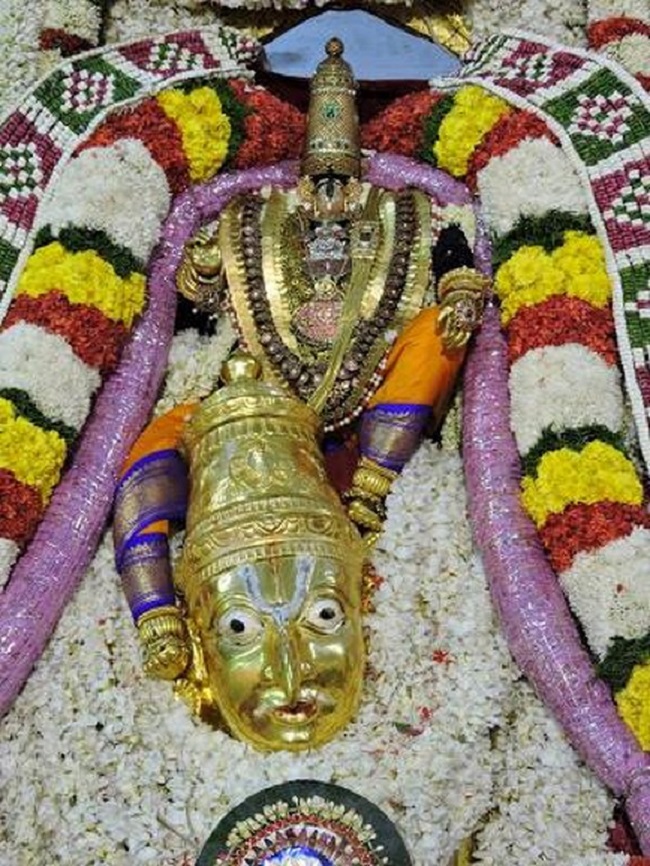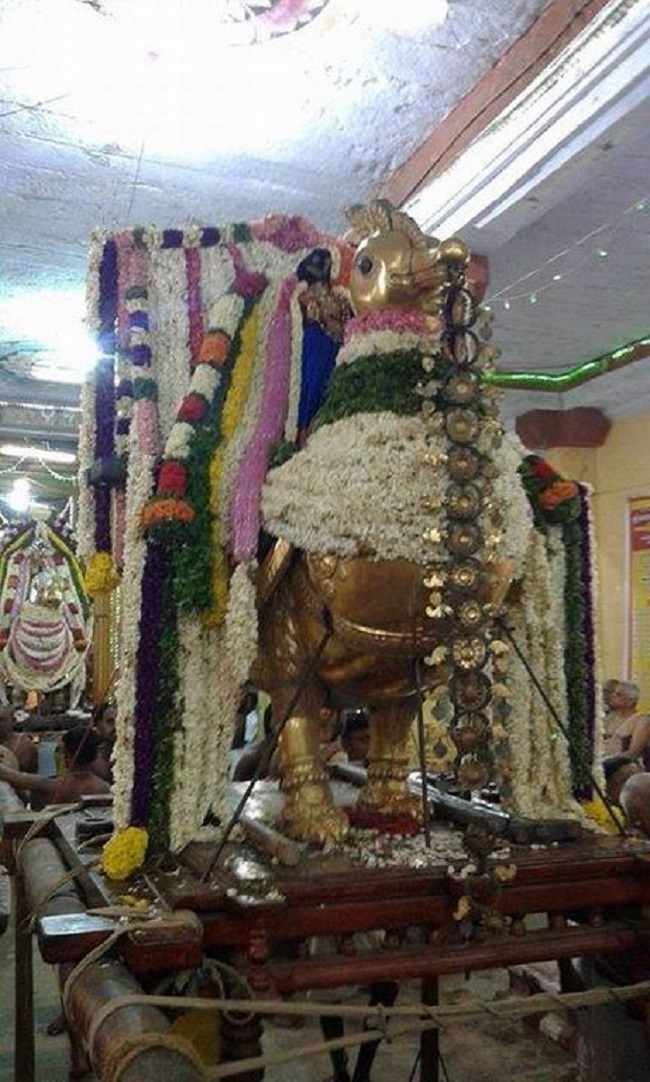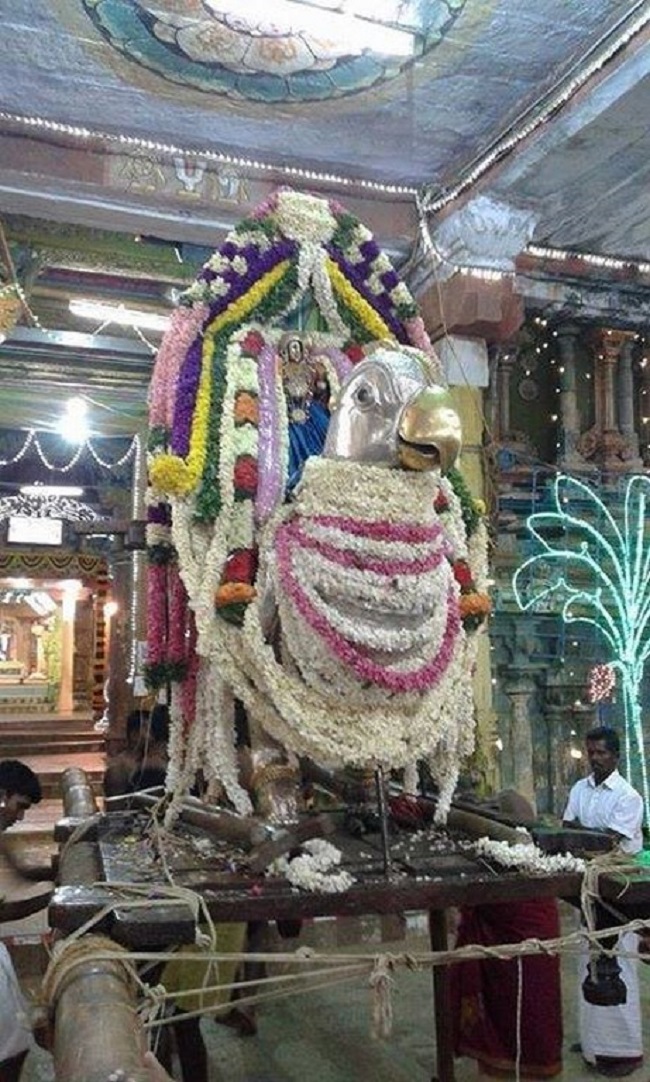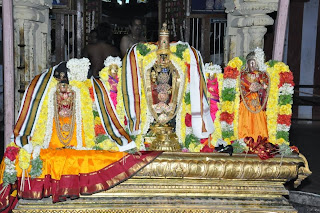We see ourselves in mirrors. But for the Lord, these ordinary mirrors can not reflect His enchanting beauty. It is only the Vedas act as mirror and show to us His beauty. King of birds, Garuda, also called as Vihageswara, is an embodiment of all Vedas. That is why, just like a mirror is in front of us to view, Garuda is in front of the Lord in all temples. He is able to see His own beauty and Majesty in Garuda. Normally, in all temples Garuda is seen with folded hands. But the Garuda in Vanamamalai temple is different. Here, Garuda, in front of the Lord outside the Garbagruha, is in a meditation pose (Picture is of the Garuda vahanam and not the moolavar Garuda). Kashyapa prajapati had two wives Kadru and Vinata. Vinata had two sons - Garuda and Aruna. Aruna was the chariot driver of the Sun. Garuda was the vehicle (vahanam) of Sriman Narayana. Kadru had snakes as children and among them Adisesha was the foremost and he served the Lord as mattress. Once Garuda visisted Nagaloka, the abode of all snakes. There he was scoffed by the snakes saying that while Garuda occasionally only had contact with the Lord, their leader Adisesha was always in contact -as bed, as throne and as sandals. Garuda became perturbed and he wanted to be associated with the Lord always and so he came to this Kshetram. Here, he started meditation and prayed to the Lord. That is how, here Garuda is in meditating pose. When the Lord asked Garuda, what he wanted, Garuda desired to be with the Lord always and so Garuda is here. The Lord also told that as vahanam, Garuda carried the Lord near every devotee. That is a very important task. Here, everyday pooja is performed to the Garuda vahanam. We saw that the Lord gets oil bath daily and the oil is drained into a well. All the sages in Naimisharanyam Kshetram are all inside the garbha gruha. Sage Vikanasa, among them, is also here. In addition to the daily oil bath, the Lord observes at least Four times Oru Kottai Ennai Kappu Utsavam. Kottai is approximately 208 litres! With that much of oil the Lord is massaged and bathed. Because the Lord takes oil bath daily, no chillies are used and instead black pepper is used. Whenever the Lord enjoys Oru Kottai Ennai Kappu Utsavam, the Lord graces devotees on the Garuda vahanam. Sireevara Mangai Nacchiyar graces on Hamsa vahanam. Sri Andal Nacchiyar graces on Kili (Parrot) vahanam.
Now, we can see the Utsava Moorthy.
By the side of Sri Sridevi, is Sri Sireevara Mangai Thayar and by the side of Sri Bhoodevi, is Sri Andal Nacchiyar. Alwar says that with His grace, he did a very small action of Saranagati, and the Lord came to Him and showed His Divine Feet.
Alwar says how can he repay this great help.He says he can not give his Atman also, because that is already the Lord's! There is nothing he could offer to the Lord. In this temple Alwar does not have separate sannidhi. He is on the satari, we normally receive in temples.
This way he is never away from the Divine Feet of the Lord!
With such beautiful view of the Lord, we will now see the sloka 7 of Chapter 6: w
Now, we can see the Utsava Moorthy.
By the side of Sri Sridevi, is Sri Sireevara Mangai Thayar and by the side of Sri Bhoodevi, is Sri Andal Nacchiyar. Alwar says that with His grace, he did a very small action of Saranagati, and the Lord came to Him and showed His Divine Feet.
Alwar says how can he repay this great help.He says he can not give his Atman also, because that is already the Lord's! There is nothing he could offer to the Lord. In this temple Alwar does not have separate sannidhi. He is on the satari, we normally receive in temples.
This way he is never away from the Divine Feet of the Lord!
With such beautiful view of the Lord, we will now see the sloka 7 of Chapter 6: w
jitatmanah prasantasya
paramatma samahitah
sitosna-sukha-duhkhesu
tatha manapamanayoh
paramatma samahitah
sitosna-sukha-duhkhesu
tatha manapamanayoh
For one who has conquered the mind, the Supersoul is already reached, for he has attained tranquility. To such a man happiness and distress, heat and cold, honor and dishonor are all the same.
This sloka in a way is connected with the story of Garuda we saw. Garuda was infuriated by the shame he underwent with the Nagas. This sloka tells that he, who is trying for Atman sakshatkaram, should never mind praise and humiliations. Sitoshna = cold and heat, sukha-duhkhesu = happiness and sorrow, tatha = and, manapamanayoh = honour and humiliation, jitatmanah = unperturbed mind, prasantasya = controls sensual organs, in such a mind, paramatma = such an exalted Atman, samahitah = is well respected. That person, whose mind is unaffected by the duals such as heat and cold, respect and disrespect or pleasure and sorrow, will have his mind full of Atma swaroopam. That means, external happenings will not affect him. What is the necessity for this sloka? Sri Krishna is going to tell how to perform yoga from sloka 10. We have seen in sloka 3, that for the person trying for Atman sakshatkaram, Karma yoga is the only course. That person who has no interest in sensual objects and who has no interest in sensual activities, is said to have attained Atman sakshatkaram, according to sloka 4. In slokas 5 and 6, it was told that detached mind is friendly and mind with attachments is enemy. Now, slokas 7, 8 and 9 become introduction to the procedure for Yoga performance, to be detailed from sloka 10. Thus in this sloka it is told that the person desiring to practice Yoga, does not mind the dualities like heat and cold. Because these are natural happenings. In fact, when the war started, Arjuna would be in tension, but Sri Krishna would be cool and halt the chariot to give rest for the horses. If Arjuna hurried, Sri Krishna would tell him that it was natural that horses needed rest. When a patient is brought to doctor in miserable condition, the doctor would be in his cool and his aim would be only how to save the patient. Likewise, the person trying for Atman sakshatkaram also will be indifferent to heat and cold, happiness and sorrow, etc. His mind will be unperturbed and he would have controlled his senses. Person who is not even trying for Karma yoga is Atma. Person who is trying Karma yoga, is Para Atman. But the one who has progressed well in reaching Atman sakshatkaram, is Param Atma (not to be mistaken as Paramatma or Brahman!). This is what Sri Krishna tells in this sloka.
(continued)







No comments:
Post a Comment